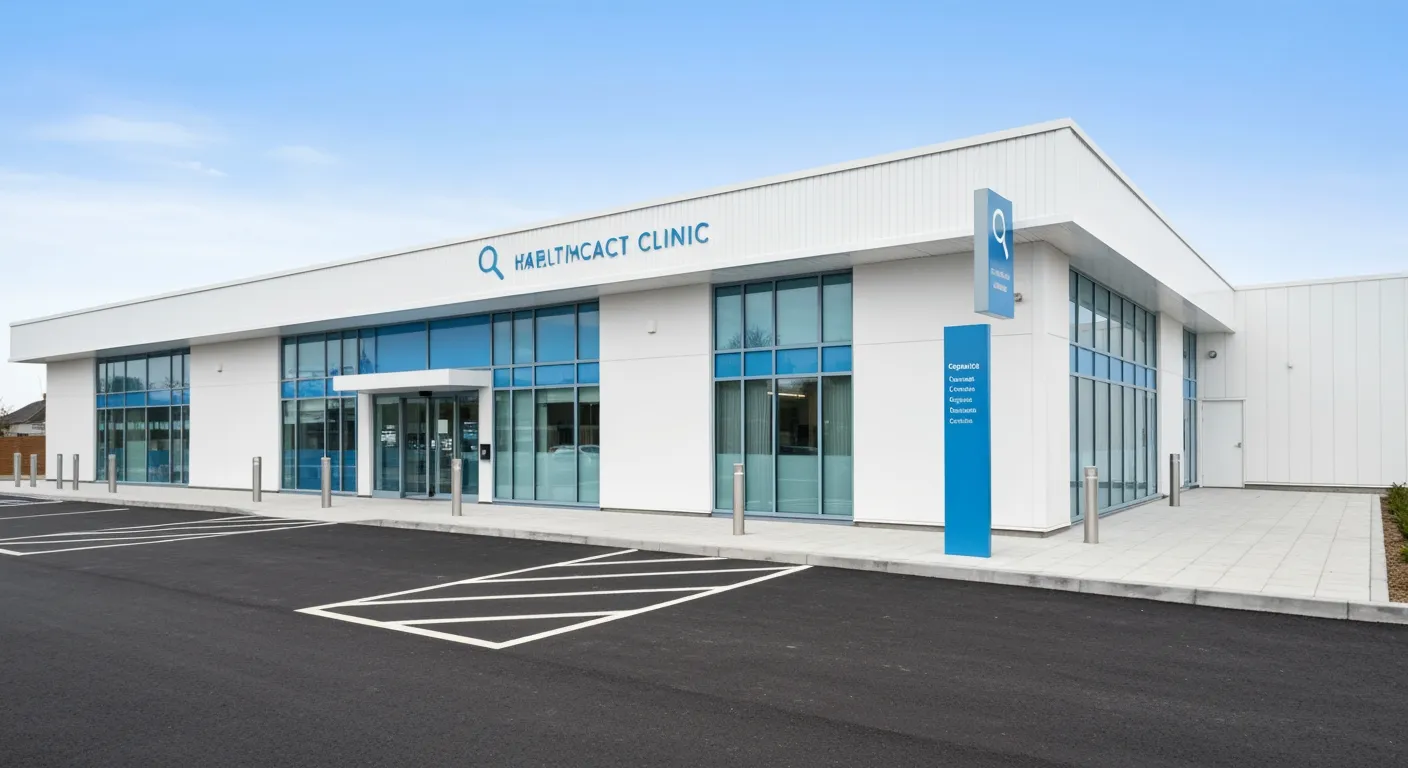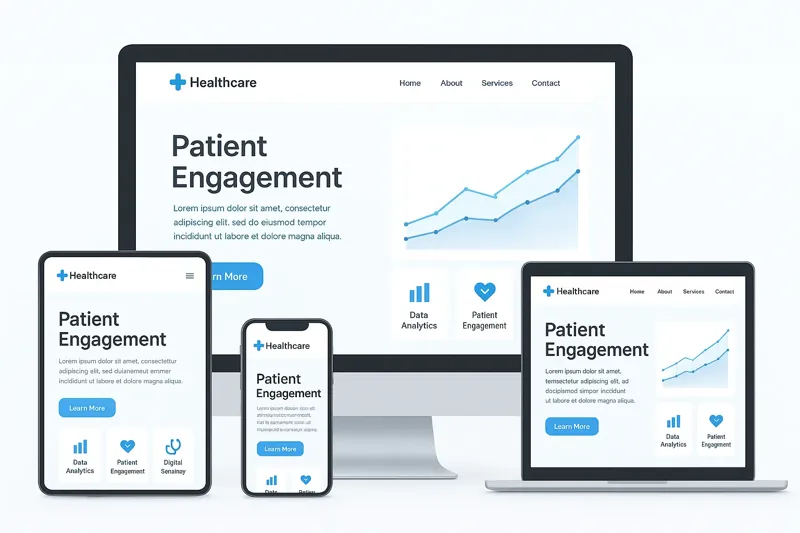The Critical Role of Local SEO in Healthcare
Definition and Importance of Local SEO for Healthcare Providers
Local SEO is the strategic process of optimizing a healthcare provider's digital presence to increase visibility in search results within a specific geographic area. It is essential for healthcare practices because most patients seek care nearby, often starting their journey with location-based queries like "doctor near me." Optimizing for local search helps practices appear in the highly competitive Local Pack or Google Map results, driving targeted traffic and greater patient engagement.
Impact of Local SEO on Patient Acquisition and Trust
Effective local SEO significantly influences patient acquisition by increasing online visibility and patient trust. Healthcare consumers overwhelmingly rely on online reviews, ratings, and testimonials, with up to 94% selecting providers based on reputation displayed in local listings. Promptly responding to reviews and encouraging fresh patient feedback improve a practice's local search rankings and credibility, reinforcing trust and encouraging appointment bookings. Optimized Google Business Profiles that include accurate contact information and business hours further build patient confidence and convenience.
Overview of How Local SEO Fits Into Broader Digital Marketing Strategies
Local SEO serves as a cornerstone within comprehensive healthcare digital marketing by complementing social media engagement, content marketing, and paid advertising. It supports brand building, drives organic traffic, and fosters patient relationships through personalized and location-focused outreach. When integrated with HIPAA-compliant digital tools and analytics, local SEO contributes measurable growth and long-term patient retention, making it vital to any successful healthcare marketing strategy.
Optimizing Google Business Profile for Maximum Visibility

How can healthcare providers optimize their Google Business Profiles to improve local search rankings?
Healthcare providers can significantly enhance their local search rankings by thoroughly optimizing their Google Business Profile (GBP). First, they must claim and verify their GBP to gain control over their practice’s online presence. Accuracy and consistency in the Name, Address, and Phone number (NAP) across all online listings are essential as Google favors uniform information when ranking local results.
Adding comprehensive and up-to-date business details is crucial. This includes clearly stating business hours, listing offered healthcare services, and maintaining high-quality photos and videos that showcase the facility and staff. Visual content not only draws patient interest but also increases engagement and search ranking.
Active management of the GBP is equally vital. Healthcare providers should monitor and respond to patient reviews promptly, ideally within 24 hours, to build trust and signal engagement to search engines. Encouraging new patient reviews helps keep the profile fresh and relevant. Regularly updating the profile with news, changes in services, or operational hours further boosts credibility and ensures patients receive accurate information.
Adopting these practices creates a robust digital footprint that enhances visibility in Google’s local '3-Pack' and improves patient trust, leading to increased appointment bookings and practice growth.
Harnessing the Power of Patient Reviews and Reputation Management
Why are patient reviews critical for local SEO and how should they be managed?
Patient reviews play a decisive role in local SEO by influencing Google’s ranking algorithms, particularly within the coveted Local Pack. Positive reviews signal trustworthiness and prominence, helping practices appear higher in search results and attracting more prospective patients. Managing these reviews strategically enhances both online reputation and search visibility through Healthcare local SEO tips.
Encouraging and soliciting fresh patient reviews consistently
Consistent generation of new patient reviews is fundamental. Healthcare providers should actively encourage satisfied patients to leave honest feedback across platforms such as Google, Healthgrades, and Facebook, which is a key part of Building trust through healthcare reviews. Incorporating gentle prompts through post-visit communications or digital campaigns can sustainably grow review volume and freshness, which are critical ranking signals as noted in Encouraging patient reviews.
Responding to reviews promptly (within 24 hours)
Timely responses to reviews—ideally within 24 hours—demonstrate attentiveness and value for patient input. Prompt, professional engagement with both positive and negative reviews enhances patient trust and signals active reputation management to search engines. This responsiveness can improve local search rankings by boosting prominence and perceived authority, aligning with best practices in Responding to online reviews in healthcare.
Compliance considerations in managing healthcare reviews
Due to patient privacy regulations like HIPAA, healthcare providers must carefully handle reviews to avoid disclosing protected health information. Responses should be crafted to respect confidentiality, avoid specifics about patient conditions, and follow legal guidelines. Utilizing HIPAA-compliant marketing tools to gather and manage reviews ensures ethical and regulatory adherence while sustaining SEO benefits.
Impact of reviews on local search rankings and patient trust
Reviews are among the strongest factors for local search ranking, affecting quantity, quality, and recency. They directly influence patient decision-making by building credibility and confidence in the practice. Practices with abundant, recent, and positive reviews typically achieve higher rankings and attract more appointment bookings, consistent with insights from Managing healthcare online reputation and Healthcare Local SEO Best Practices.
| Strategy | SEO Benefit | Patient Outcome |
|---|---|---|
| Encourage fresh reviews | Improves ranking signals | Builds trust and credibility |
| Respond promptly (within 24 hrs) | Signals active engagement | Enhances patient satisfaction |
| Comply with healthcare laws | Avoids penalties and risks | Protects patient confidentiality |
Effectively harnessing patient reviews and reputation management delivers measurable growth, helping healthcare practices rise above competitors and establish strong community trust, supported by Healthcare SEO strategies and Local SEO for Healthcare Providers.
Strategic Local Keyword Research and Content Optimization
How can healthcare providers effectively conduct local keyword research and integrate findings into their SEO strategy?
Healthcare providers can conduct local keyword research by leveraging powerful SEO tools such as Semrush Keyword Gap tool, Google Keyword Planner for local SEO, and Keyword research with Ubersuggest. These platforms help identify high-value local keywords, including long-tail and intent-driven phrases that reflect how patients search for healthcare services in specific geographic areas.
Strategically targeting keywords like “emergency hospital Los Angeles” or “pediatrician near me” enhances search relevance and improves visibility in local search results. Incorporating these keywords naturally within website elements such as meta descriptions, title tags, headers, and content is essential to avoid keyword stuffing and maintain readability.
Creating dedicated location-specific landing pages for multiple practice sites supports precise targeting and better rankings by addressing the unique search intent of local patients. Blogs and FAQs tailored with localized healthcare themes can also embed these keywords to boost organic traffic and engagement.
Consistent integration of local keywords across content types—including service pages and educational materials—strengthens Google’s understanding of the practice’s geographic focus, resulting in higher listings within Google’s Local Pack and traditional search results.
By applying these strategic keyword research and content optimization techniques, healthcare organizations can drive targeted patient growth, increase appointment bookings, and establish stronger community presence. For comprehensive guidance on Healthcare local SEO tips and best practices, providers can also explore detailed strategies for optimizing their Google Business Profile and local SEO through resources like Local SEO for Healthcare Providers.
Creating Location-Specific Landing Pages for Multi-Location Practices

What is the importance of location-specific landing pages in local SEO for healthcare providers with multiple clinics?
Location-specific landing pages are essential for healthcare providers managing multiple practice locations. These pages enable targeted optimization for geographically relevant searches, which increases the likelihood of appearing in local search results for each particular area.
Creating dedicated landing pages allows practices to present consistent and accurate Name, Address, and Phone number (NAP) consistency in local SEO data tailored to each location, boosting both patient trust and search engine confidence. Localized content further enhances the relevance by addressing community-specific healthcare needs and services.
Optimizing these pages with geo-targeted keywords in titles, meta descriptions, and content ensures better alignment with user search intent. Additionally, implementing schema markup such as LocalBusiness or MedicalOrganization schema structures improves how search engines interpret and display your location information in search results, often leading to enhanced rich snippets.
Enhancing user experience by embedding interactive maps and including clear, accessible contact forms simplifies appointment bookings and patient inquiries. These features not only support user engagement but also positively impact SEO through improved on-page metrics.
Overall, location-specific landing pages provide a competitive advantage by increasing visibility in local searches, driving patient acquisition for each practice site, and reinforcing the healthcare provider’s authority within their serviced communities. For additional insights on building effective location pages and local SEO benefits, see Local SEO for healthcare providers and Healthcare Local SEO Tips.
Leveraging Schema Markup to Enhance Search Result Appearance

Types of healthcare-relevant schema: LocalBusiness, MedicalOrganization, Physician
Healthcare providers benefit from implementing specific schema types tailored to their industry. Common schemas include:
- LocalBusiness: Defines the general business information such as Name, Address, and Phone number (NAP) consistency in local SEO, and hours.
- MedicalOrganization: Highlights details unique to healthcare organizations, including offered medical services and specialties.
- Physician: Focuses on individual practitioners with credentials, specialties, and contact details.
Learn more about Schema Markup for Healthcare Websites and its role in medical SEO.
How structured data improves search engine understanding
Structured data via schema markup offers a clear, standardized format for search engines to interpret relevant information found on healthcare websites. This clarity allows engines like Google to more accurately categorize practices, services, and providers leading to better indexing. By embedding schema, healthcare sites communicate essential details directly to search algorithms, reducing ambiguity in search results.
Explore how Google’s SEO Starter Guide recommends using structured data and discover its impact on Improving Local Search Rankings in Healthcare.
Benefits for rich snippets, star ratings, service information
One of the primary advantages of schema markup is the enhancement of search listings with rich snippets. These can display star ratings from Building trust through healthcare reviews, operating hours, service types, and other pertinent snippets right within search results. Such enriched listings increase user trust and engagement by presenting actionable and trustworthy information upfront, often boosting click-through rates and appointment bookings.
Guidance on Building Trust through Healthcare Reviews and Encouraging Patient Reviews can further enhance your SEO strategy.
Schema's role in future AI-driven search results
Looking ahead, schema markup plays a critical role in optimizing for AI-driven search features and voice assistant results. Structured data facilitates the generation of AI summaries and direct answers, helping practices to surface prominently in the evolving landscape of AI-powered local search. Utilizing schema is a proactive strategy to maintain visibility as search engines become increasingly reliant on AI to synthesize and present information.
For insights on Optimizing Local SEO for AI Overviews and AI SEO for Doctors in 2025, see the linked resources.
How does schema markup improve local SEO for healthcare providers?
Schema markup helps search engines better understand website content by providing structured data about the business location, services, providers, and ratings. This can result in enhanced search listings with rich snippets, such as star reviews and operational hours, improving click-through rates and visibility, particularly in AI-driven search environments.
See detailed strategies and benefits in Local SEO for Healthcare Providers and Google Business Profile optimization for healthcare.
Building and Maintaining Consistent Local Citations and Backlinks

Why are local citations and backlinks important for healthcare local SEO, and how can providers build them effectively?
Consistent local citations—ensuring the practice’s Name, Address, and Phone number (NAP) consistency in local SEO are uniform across all directories—strengthen Google's trust in the provider's legitimacy. This consistency improves local search rankings by signaling to search engines that the business information is accurate and reliable. Backlinks from reputable sources enhance the website's domain authority and visibility, contributing to increased local prominence in search results.
Importance of consistent NAP citations across directories
Maintaining consistent NAP data across various online listings prevents confusion for patients and search engines alike. It directly influences local ranking factors because inconsistent information can dilute the practice's credibility and lower its position in local search packs. Regular audits and updates ensure all citations match the official practice details to sustain SEO benefits. See Managing healthcare reviews and consistent NAP information.
Top directories for healthcare listings
Healthcare providers should secure and optimize listings on authoritative healthcare-specific and general directories such as Healthgrades, Vitals, Yelp, Zocdoc, and Bing Places. These platforms are essential for patient discovery and serve as trusted sources for citation and review aggregation, boosting local SEO performance.
Local link building through community partnerships and sponsorships
Building backlinks through partnerships with local businesses, sponsoring community events, or engaging with nonprofit organizations establishes valuable local relationships. These initiatives generate high-quality backlinks from relevant local domains that signal community involvement to search engines, elevating local search prominence. For effective strategies, refer to Local SEO marketing strategy for home healthcare franchise and Building backlinks from reputable medical websites.
Influence of backlinks on local search prominence and domain authority
Backlinks from respected local and healthcare-related websites validate the practice’s authority and trustworthiness. Such links enhance the domain authority metric, helping the practice rank higher not only in localized searches but also in broader organic search results. Quality backlinks complement citation efforts to create a robust local SEO strategy.
Enhancing Website Technical SEO and User Experience for Local Search
What technical SEO and user experience factors should healthcare providers prioritize to boost local SEO performance?
Healthcare providers must prioritize several technical SEO and user experience elements to improve local search visibility effectively.
Mobile Optimization and Responsive Design
With over 60% of local health-related searches performed on mobile devices, ensuring websites are fully responsive across all screen sizes is critical. Responsive design adapts content seamlessly to smartphones and tablets, providing a consistent and user-friendly patient experience that supports higher search rankings. For more on Mobile optimization for healthcare websites, see Medical SEO guide and Tips for successful website redesigns in healthcare.
Improving Page Speed and Load Times
Fast-loading pages reduce bounce rates and improve user engagement. Providers should optimize images by compressing them, minimize scripts and CSS files, and leverage browser caching. Tools like Google PageSpeed Insights help identify bottlenecks affecting speed, crucial for both desktop and mobile performance.
Securing the Site with HTTPS/SSL Certificates
Implementing HTTPS via SSL certificates not only protects patient data but also enhances trustworthiness, a factor Google uses in its search ranking algorithms. Secured websites signal reliability and compliance, especially vital for sites with patient portals or appointment bookings. See details on SSL certificates for medical sites.
Streamlining Site Architecture and Internal Linking
A clear, logical site architecture aids search engines in crawling and indexing web pages efficiently. Internal linking should connect related content contextually, guiding users and bots throughout the site. This improves page authority distribution and enhances user navigation, boosting SEO relevance. Learn more about website architecture and internal linking.
Creating Accessible, Readable Content
Web content must be accessible and easy to comprehend for all users, including those with disabilities. This involves using legible fonts, sufficient contrast, proper heading structures, and alt text for images. Clear, concise medical information written in patient-friendly language increases engagement and dwell time, positively impacting SEO. For guidance, reference E-E-A-T (Expertise, Experience, Authority, Trustworthiness) in healthcare content and Healthcare SEO best practices.
Investing in these technical and user experience improvements lays a strong foundation for healthcare providers’ local SEO efforts, helping them rank higher, engage patients effectively, and drive measurable growth in their communities. For comprehensive strategies, see Local SEO for healthcare providers and Healthcare SEO guide.
Producing High-Quality, E-E-A-T Compliant Content for Patient Trust and SEO
How does E-E-A-T (Expertise, Experience, Authority, Trustworthiness) impact local SEO for healthcare providers?
E-E-A-T plays a crucial role in improving local SEO performance for healthcare providers by building patient trust and aligning content with Google’s stringent standards for medical information. Ensuring content is authored or reviewed by qualified clinicians adds depth of expertise and authoritative weight, which search engines recognize and reward in rankings (E-E-A-T (Expertise, Experience, Authority, Trustworthiness) in healthcare content, E-E-A-T (Expertise, Experience, Authority, Trustworthiness) in healthcare content.
Showcasing credentials, such as medical degrees, certifications, accreditations, and patient testimonials, further reinforces a practice’s trustworthiness and authority. This transparency assures potential patients of quality care and enhances the provider's online reputation (Building trust through healthcare reviews, Healthcare provider local SEO).
Creating educational and patient-focused content with a local perspective addresses specific health needs within the community. This type of content effectively answers patient queries and uses location-relevant keywords, boosting relevance and search visibility (Healthcare Local SEO Tips, Local SEO overview).
Leveraging a range of content formats like FAQs, blogs, and videos supports varied patient engagement. FAQs anticipate and address common health concerns, blogs offer in-depth explanations on healthcare topics, and videos introduce providers and explain procedures, increasing on-page time and user interaction (AI SEO for Doctors in 2025, Healthcare SEO Best Practices.
Integrating these elements collectively supports a strong E-E-A-T profile, which benefits local SEO by making healthcare providers more discoverable, trusted, and authoritative in their geographic market (Google Business Profile optimization for healthcare, Improving local search rankings in healthcare.
Engaging Patients Through Multi-Channel Local Marketing Integration
How can integration of multi-channel marketing strengthen local SEO outcomes for healthcare practices?
Integrating multiple marketing channels creates a powerful synergy that significantly enhances local SEO results for healthcare providers. By combining social media profiles tailored to local audiences, engaging video content, HIPAA-compliant email and SMS marketing, and strategic content marketing, practices can greatly increase patient engagement and visibility.
Social media pages customized for local communities contribute to higher local search prominence by signaling relevance and increasing patient interaction. Active engagement on platforms like Facebook also supports greater indexing by Google, improving rankings. Videos, such as provider introductions and FAQ sessions, increase website dwell time and patient trust, which are important ranking factors (Healthcare SEO best practices.
Compliant email and SMS campaigns allow personalized, secure communication that improves patient retention. These campaigns, when synchronized with online reputation efforts, generate more branded searches and direct web visits, reinforcing SEO signals. Meanwhile, regular blog posts and community updates with location-specific content build authority and address local health interests, further supporting search relevance (Healthcare SEO guide).
Together, these integrated local marketing tactics create a comprehensive patient journey that not only raises awareness and trust but also drives measurable organic growth in patient acquisition and practice revenue.
Monitoring, Analyzing, and Adapting Local SEO Performance

Tracking rankings with geo-grid rank trackers and tools like Google Analytics
Healthcare providers benefit from precise tracking of their local search rankings using geo-grid rank trackers to assess visibility in different geographic segments. Tools such as Google Analytics for healthcare SEO allow practices to analyze website traffic patterns and patient behavior, helping measure the effectiveness of SEO efforts.
Analyzing patient review trends and engagement metrics
Monitoring patient reviews is vital as reviews influence local search rankings and patient trust. Trends in review quantity, quality, and recency should be analyzed regularly. Engagement metrics, such as time spent on pages and conversion rates, provide actionable data to improve user experience and content relevance. Managing patient reviews and responding to online reviews in healthcare are critical components of this process.
Benchmarking against local competitors’ SEO
Comparing local SEO performance with competitors uncovers gaps and opportunities. Practices should analyze competitors' keyword strategies, Google Business Profile optimizations, backlink profiles, and online reputation to refine their own approach and increase competitive advantage. Using tools like the Semrush Keyword Gap tool helps identify keyword opportunities and local SEO strategies used by others.
Ongoing updates to content, listings, and technical SEO per algorithm changes
Search engines update ranking algorithms frequently, necessitating healthcare providers to update website content, refresh Google Business Profiles, manage Name, Address, and Phone number (NAP) consistency in local SEO, and refine technical SEO elements like site speed, Mobile optimization for healthcare websites, and schema markup. Staying current ensures sustained or improved visibility in local search results. Refer to Healthcare SEO best practices and technical SEO for healthcare websites to guide ongoing SEO improvements.
Why is continuous monitoring and updating essential in local SEO for healthcare providers?
Local SEO is a dynamic process requiring ongoing attention. Continuous monitoring via analytics and rank tracking tools helps identify performance trends and areas for improvement. Patient review analysis supports reputation management, while competitor benchmarking informs strategic decisions. Regular content and technical updates ensure compliance with evolving search engine criteria, securing high rankings and patient acquisition in an ever-changing digital environment. For comprehensive guidance, explore Local SEO marketing strategies for healthcare and Optimizing Google Business Profile for healthcare.
Sustaining Local SEO Success: Strategic Commitment for Healthcare Providers
Comprehensive Local SEO Strategies
Healthcare providers must integrate a diverse set of local SEO tactics to maximize visibility and patient acquisition. Key actions include optimizing Google Business Profiles with accurate and current information, consistently encouraging and managing patient reviews, and implementing location-specific landing pages enriched with targeted local keywords. Incorporating schema markup enhances search result appearance, while maintaining NAP consistency across all listings builds credibility and local prominence. High-quality, community-focused content and engaging in local link-building efforts further strengthen online authority and search rankings.
Patience and Consistent Effort
Local SEO is a long-term growth strategy that requires patience and persistent effort. Results typically develop over months, influenced by competition and ongoing optimization. Maintaining an active digital presence, regularly updating practice information, and engaging with patients through reviews and social media are essential to sustaining ranking improvements and trust.
Partnering with Experts for Compliance and Data-Driven Execution
Collaborating with experienced SEO agencies specializing in healthcare ensures strategies are data-driven, compliant with HIPAA regulations, and aligned with evolving search algorithms, including AI-driven trends. Expert management facilitates targeted keyword research, technical SEO enhancements, and reputation management—critical elements for measurable patient growth and competitive advantage.
Prioritizing Local SEO as a Growth Driver
Given that the majority of patients search for local care and rely on online reputation and visibility, healthcare organizations must prioritize local SEO as a foundational marketing discipline. It delivers cost-effective, sustainable patient acquisition and elevates the provider’s credibility within the community, ultimately driving consistent appointment bookings and practice growth.
The Critical Role of Local SEO in Healthcare
Definition and Importance of Local SEO for Healthcare Providers
Local SEO is the strategic process of optimizing a healthcare provider's digital presence to increase visibility in search results within a specific geographic area. It is essential for healthcare practices because most patients seek care nearby, often starting their journey with location-based queries like "doctor near me." Optimizing for local search helps practices appear in the highly competitive Local Pack or Google Map results, driving targeted traffic and greater patient engagement.
Impact of Local SEO on Patient Acquisition and Trust
Effective local SEO significantly influences patient acquisition by increasing online visibility and patient trust. Healthcare consumers overwhelmingly rely on online reviews, ratings, and testimonials, with up to 94% selecting providers based on reputation displayed in local listings. Promptly responding to reviews and encouraging fresh patient feedback improve a practice's local search rankings and credibility, reinforcing trust and encouraging appointment bookings. Optimized Google Business Profiles that include accurate contact information and business hours further build patient confidence and convenience.
Overview of How Local SEO Fits Into Broader Digital Marketing Strategies
Local SEO serves as a cornerstone within comprehensive healthcare digital marketing by complementing social media engagement, content marketing, and paid advertising. It supports brand building, drives organic traffic, and fosters patient relationships through personalized and location-focused outreach. When integrated with HIPAA-compliant digital tools and analytics, local SEO contributes measurable growth and long-term patient retention, making it vital to any successful healthcare marketing strategy.
Optimizing Google Business Profile for Maximum Visibility

How can healthcare providers optimize their Google Business Profiles to improve local search rankings?
Healthcare providers can significantly enhance their local search rankings by thoroughly optimizing their Google Business Profile (GBP). First, they must claim and verify their GBP to gain control over their practice’s online presence. Accuracy and consistency in the Name, Address, and Phone number (NAP) across all online listings are essential as Google favors uniform information when ranking local results.
Adding comprehensive and up-to-date business details is crucial. This includes clearly stating business hours, listing offered healthcare services, and maintaining high-quality photos and videos that showcase the facility and staff. Visual content not only draws patient interest but also increases engagement and search ranking.
Active management of the GBP is equally vital. Healthcare providers should monitor and respond to patient reviews promptly, ideally within 24 hours, to build trust and signal engagement to search engines. Encouraging new patient reviews helps keep the profile fresh and relevant. Regularly updating the profile with news, changes in services, or operational hours further boosts credibility and ensures patients receive accurate information.
Adopting these practices creates a robust digital footprint that enhances visibility in Google’s local '3-Pack' and improves patient trust, leading to increased appointment bookings and practice growth.
Harnessing the Power of Patient Reviews and Reputation Management
Why are patient reviews critical for local SEO and how should they be managed?
Patient reviews play a decisive role in local SEO by influencing Google’s ranking algorithms, particularly within the coveted Local Pack. Positive reviews signal trustworthiness and prominence, helping practices appear higher in search results and attracting more prospective patients. Managing these reviews strategically enhances both online reputation and search visibility through Healthcare local SEO tips.
Encouraging and soliciting fresh patient reviews consistently
Consistent generation of new patient reviews is fundamental. Healthcare providers should actively encourage satisfied patients to leave honest feedback across platforms such as Google, Healthgrades, and Facebook, which is a key part of Building trust through healthcare reviews. Incorporating gentle prompts through post-visit communications or digital campaigns can sustainably grow review volume and freshness, which are critical ranking signals as noted in Encouraging patient reviews.
Responding to reviews promptly (within 24 hours)
Timely responses to reviews—ideally within 24 hours—demonstrate attentiveness and value for patient input. Prompt, professional engagement with both positive and negative reviews enhances patient trust and signals active reputation management to search engines. This responsiveness can improve local search rankings by boosting prominence and perceived authority, aligning with best practices in Responding to online reviews in healthcare.
Compliance considerations in managing healthcare reviews
Due to patient privacy regulations like HIPAA, healthcare providers must carefully handle reviews to avoid disclosing protected health information. Responses should be crafted to respect confidentiality, avoid specifics about patient conditions, and follow legal guidelines. Utilizing HIPAA-compliant marketing tools to gather and manage reviews ensures ethical and regulatory adherence while sustaining SEO benefits.
Impact of reviews on local search rankings and patient trust
Reviews are among the strongest factors for local search ranking, affecting quantity, quality, and recency. They directly influence patient decision-making by building credibility and confidence in the practice. Practices with abundant, recent, and positive reviews typically achieve higher rankings and attract more appointment bookings, consistent with insights from Managing healthcare online reputation and Healthcare Local SEO Best Practices.
| Strategy | SEO Benefit | Patient Outcome |
|---|---|---|
| Encourage fresh reviews | Improves ranking signals | Builds trust and credibility |
| Respond promptly (within 24 hrs) | Signals active engagement | Enhances patient satisfaction |
| Comply with healthcare laws | Avoids penalties and risks | Protects patient confidentiality |
Effectively harnessing patient reviews and reputation management delivers measurable growth, helping healthcare practices rise above competitors and establish strong community trust, supported by Healthcare SEO strategies and Local SEO for Healthcare Providers.
Strategic Local Keyword Research and Content Optimization
How can healthcare providers effectively conduct local keyword research and integrate findings into their SEO strategy?
Healthcare providers can conduct local keyword research by leveraging powerful SEO tools such as Semrush Keyword Gap tool, Google Keyword Planner for local SEO, and Keyword research with Ubersuggest. These platforms help identify high-value local keywords, including long-tail and intent-driven phrases that reflect how patients search for healthcare services in specific geographic areas.
Strategically targeting keywords like “emergency hospital Los Angeles” or “pediatrician near me” enhances search relevance and improves visibility in local search results. Incorporating these keywords naturally within website elements such as meta descriptions, title tags, headers, and content is essential to avoid keyword stuffing and maintain readability.
Creating dedicated location-specific landing pages for multiple practice sites supports precise targeting and better rankings by addressing the unique search intent of local patients. Blogs and FAQs tailored with localized healthcare themes can also embed these keywords to boost organic traffic and engagement.
Consistent integration of local keywords across content types—including service pages and educational materials—strengthens Google’s understanding of the practice’s geographic focus, resulting in higher listings within Google’s Local Pack and traditional search results.
By applying these strategic keyword research and content optimization techniques, healthcare organizations can drive targeted patient growth, increase appointment bookings, and establish stronger community presence. For comprehensive guidance on Healthcare local SEO tips and best practices, providers can also explore detailed strategies for optimizing their Google Business Profile and local SEO through resources like Local SEO for Healthcare Providers.
Creating Location-Specific Landing Pages for Multi-Location Practices

What is the importance of location-specific landing pages in local SEO for healthcare providers with multiple clinics?
Location-specific landing pages are essential for healthcare providers managing multiple practice locations. These pages enable targeted optimization for geographically relevant searches, which increases the likelihood of appearing in local search results for each particular area.
Creating dedicated landing pages allows practices to present consistent and accurate Name, Address, and Phone number (NAP) consistency in local SEO data tailored to each location, boosting both patient trust and search engine confidence. Localized content further enhances the relevance by addressing community-specific healthcare needs and services.
Optimizing these pages with geo-targeted keywords in titles, meta descriptions, and content ensures better alignment with user search intent. Additionally, implementing schema markup such as LocalBusiness or MedicalOrganization schema structures improves how search engines interpret and display your location information in search results, often leading to enhanced rich snippets.
Enhancing user experience by embedding interactive maps and including clear, accessible contact forms simplifies appointment bookings and patient inquiries. These features not only support user engagement but also positively impact SEO through improved on-page metrics.
Overall, location-specific landing pages provide a competitive advantage by increasing visibility in local searches, driving patient acquisition for each practice site, and reinforcing the healthcare provider’s authority within their serviced communities. For additional insights on building effective location pages and local SEO benefits, see Local SEO for healthcare providers and Healthcare Local SEO Tips.
Leveraging Schema Markup to Enhance Search Result Appearance

Types of healthcare-relevant schema: LocalBusiness, MedicalOrganization, Physician
Healthcare providers benefit from implementing specific schema types tailored to their industry. Common schemas include:
- LocalBusiness: Defines the general business information such as Name, Address, and Phone number (NAP) consistency in local SEO, and hours.
- MedicalOrganization: Highlights details unique to healthcare organizations, including offered medical services and specialties.
- Physician: Focuses on individual practitioners with credentials, specialties, and contact details.
Learn more about Schema Markup for Healthcare Websites and its role in medical SEO.
How structured data improves search engine understanding
Structured data via schema markup offers a clear, standardized format for search engines to interpret relevant information found on healthcare websites. This clarity allows engines like Google to more accurately categorize practices, services, and providers leading to better indexing. By embedding schema, healthcare sites communicate essential details directly to search algorithms, reducing ambiguity in search results.
Explore how Google’s SEO Starter Guide recommends using structured data and discover its impact on Improving Local Search Rankings in Healthcare.
Benefits for rich snippets, star ratings, service information
One of the primary advantages of schema markup is the enhancement of search listings with rich snippets. These can display star ratings from Building trust through healthcare reviews, operating hours, service types, and other pertinent snippets right within search results. Such enriched listings increase user trust and engagement by presenting actionable and trustworthy information upfront, often boosting click-through rates and appointment bookings.
Guidance on Building Trust through Healthcare Reviews and Encouraging Patient Reviews can further enhance your SEO strategy.
Schema's role in future AI-driven search results
Looking ahead, schema markup plays a critical role in optimizing for AI-driven search features and voice assistant results. Structured data facilitates the generation of AI summaries and direct answers, helping practices to surface prominently in the evolving landscape of AI-powered local search. Utilizing schema is a proactive strategy to maintain visibility as search engines become increasingly reliant on AI to synthesize and present information.
For insights on Optimizing Local SEO for AI Overviews and AI SEO for Doctors in 2025, see the linked resources.
How does schema markup improve local SEO for healthcare providers?
Schema markup helps search engines better understand website content by providing structured data about the business location, services, providers, and ratings. This can result in enhanced search listings with rich snippets, such as star reviews and operational hours, improving click-through rates and visibility, particularly in AI-driven search environments.
See detailed strategies and benefits in Local SEO for Healthcare Providers and Google Business Profile optimization for healthcare.
Building and Maintaining Consistent Local Citations and Backlinks

Why are local citations and backlinks important for healthcare local SEO, and how can providers build them effectively?
Consistent local citations—ensuring the practice’s Name, Address, and Phone number (NAP) consistency in local SEO are uniform across all directories—strengthen Google's trust in the provider's legitimacy. This consistency improves local search rankings by signaling to search engines that the business information is accurate and reliable. Backlinks from reputable sources enhance the website's domain authority and visibility, contributing to increased local prominence in search results.
Importance of consistent NAP citations across directories
Maintaining consistent NAP data across various online listings prevents confusion for patients and search engines alike. It directly influences local ranking factors because inconsistent information can dilute the practice's credibility and lower its position in local search packs. Regular audits and updates ensure all citations match the official practice details to sustain SEO benefits. See Managing healthcare reviews and consistent NAP information.
Top directories for healthcare listings
Healthcare providers should secure and optimize listings on authoritative healthcare-specific and general directories such as Healthgrades, Vitals, Yelp, Zocdoc, and Bing Places. These platforms are essential for patient discovery and serve as trusted sources for citation and review aggregation, boosting local SEO performance.
Local link building through community partnerships and sponsorships
Building backlinks through partnerships with local businesses, sponsoring community events, or engaging with nonprofit organizations establishes valuable local relationships. These initiatives generate high-quality backlinks from relevant local domains that signal community involvement to search engines, elevating local search prominence. For effective strategies, refer to Local SEO marketing strategy for home healthcare franchise and Building backlinks from reputable medical websites.
Influence of backlinks on local search prominence and domain authority
Backlinks from respected local and healthcare-related websites validate the practice’s authority and trustworthiness. Such links enhance the domain authority metric, helping the practice rank higher not only in localized searches but also in broader organic search results. Quality backlinks complement citation efforts to create a robust local SEO strategy.
Enhancing Website Technical SEO and User Experience for Local Search
What technical SEO and user experience factors should healthcare providers prioritize to boost local SEO performance?
Healthcare providers must prioritize several technical SEO and user experience elements to improve local search visibility effectively.
Mobile Optimization and Responsive Design
With over 60% of local health-related searches performed on mobile devices, ensuring websites are fully responsive across all screen sizes is critical. Responsive design adapts content seamlessly to smartphones and tablets, providing a consistent and user-friendly patient experience that supports higher search rankings. For more on Mobile optimization for healthcare websites, see Medical SEO guide and Tips for successful website redesigns in healthcare.
Improving Page Speed and Load Times
Fast-loading pages reduce bounce rates and improve user engagement. Providers should optimize images by compressing them, minimize scripts and CSS files, and leverage browser caching. Tools like Google PageSpeed Insights help identify bottlenecks affecting speed, crucial for both desktop and mobile performance.
Securing the Site with HTTPS/SSL Certificates
Implementing HTTPS via SSL certificates not only protects patient data but also enhances trustworthiness, a factor Google uses in its search ranking algorithms. Secured websites signal reliability and compliance, especially vital for sites with patient portals or appointment bookings. See details on SSL certificates for medical sites.
Streamlining Site Architecture and Internal Linking
A clear, logical site architecture aids search engines in crawling and indexing web pages efficiently. Internal linking should connect related content contextually, guiding users and bots throughout the site. This improves page authority distribution and enhances user navigation, boosting SEO relevance. Learn more about website architecture and internal linking.
Creating Accessible, Readable Content
Web content must be accessible and easy to comprehend for all users, including those with disabilities. This involves using legible fonts, sufficient contrast, proper heading structures, and alt text for images. Clear, concise medical information written in patient-friendly language increases engagement and dwell time, positively impacting SEO. For guidance, reference E-E-A-T (Expertise, Experience, Authority, Trustworthiness) in healthcare content and Healthcare SEO best practices.
Investing in these technical and user experience improvements lays a strong foundation for healthcare providers’ local SEO efforts, helping them rank higher, engage patients effectively, and drive measurable growth in their communities. For comprehensive strategies, see Local SEO for healthcare providers and Healthcare SEO guide.
Producing High-Quality, E-E-A-T Compliant Content for Patient Trust and SEO
How does E-E-A-T (Expertise, Experience, Authority, Trustworthiness) impact local SEO for healthcare providers?
E-E-A-T plays a crucial role in improving local SEO performance for healthcare providers by building patient trust and aligning content with Google’s stringent standards for medical information. Ensuring content is authored or reviewed by qualified clinicians adds depth of expertise and authoritative weight, which search engines recognize and reward in rankings (E-E-A-T (Expertise, Experience, Authority, Trustworthiness) in healthcare content, E-E-A-T (Expertise, Experience, Authority, Trustworthiness) in healthcare content.
Showcasing credentials, such as medical degrees, certifications, accreditations, and patient testimonials, further reinforces a practice’s trustworthiness and authority. This transparency assures potential patients of quality care and enhances the provider's online reputation (Building trust through healthcare reviews, Healthcare provider local SEO).
Creating educational and patient-focused content with a local perspective addresses specific health needs within the community. This type of content effectively answers patient queries and uses location-relevant keywords, boosting relevance and search visibility (Healthcare Local SEO Tips, Local SEO overview).
Leveraging a range of content formats like FAQs, blogs, and videos supports varied patient engagement. FAQs anticipate and address common health concerns, blogs offer in-depth explanations on healthcare topics, and videos introduce providers and explain procedures, increasing on-page time and user interaction (AI SEO for Doctors in 2025, Healthcare SEO Best Practices.
Integrating these elements collectively supports a strong E-E-A-T profile, which benefits local SEO by making healthcare providers more discoverable, trusted, and authoritative in their geographic market (Google Business Profile optimization for healthcare, Improving local search rankings in healthcare.
Engaging Patients Through Multi-Channel Local Marketing Integration
How can integration of multi-channel marketing strengthen local SEO outcomes for healthcare practices?
Integrating multiple marketing channels creates a powerful synergy that significantly enhances local SEO results for healthcare providers. By combining social media profiles tailored to local audiences, engaging video content, HIPAA-compliant email and SMS marketing, and strategic content marketing, practices can greatly increase patient engagement and visibility.
Social media pages customized for local communities contribute to higher local search prominence by signaling relevance and increasing patient interaction. Active engagement on platforms like Facebook also supports greater indexing by Google, improving rankings. Videos, such as provider introductions and FAQ sessions, increase website dwell time and patient trust, which are important ranking factors (Healthcare SEO best practices.
Compliant email and SMS campaigns allow personalized, secure communication that improves patient retention. These campaigns, when synchronized with online reputation efforts, generate more branded searches and direct web visits, reinforcing SEO signals. Meanwhile, regular blog posts and community updates with location-specific content build authority and address local health interests, further supporting search relevance (Healthcare SEO guide).
Together, these integrated local marketing tactics create a comprehensive patient journey that not only raises awareness and trust but also drives measurable organic growth in patient acquisition and practice revenue.
Monitoring, Analyzing, and Adapting Local SEO Performance

Tracking rankings with geo-grid rank trackers and tools like Google Analytics
Healthcare providers benefit from precise tracking of their local search rankings using geo-grid rank trackers to assess visibility in different geographic segments. Tools such as Google Analytics for healthcare SEO allow practices to analyze website traffic patterns and patient behavior, helping measure the effectiveness of SEO efforts.
Analyzing patient review trends and engagement metrics
Monitoring patient reviews is vital as reviews influence local search rankings and patient trust. Trends in review quantity, quality, and recency should be analyzed regularly. Engagement metrics, such as time spent on pages and conversion rates, provide actionable data to improve user experience and content relevance. Managing patient reviews and responding to online reviews in healthcare are critical components of this process.
Benchmarking against local competitors’ SEO
Comparing local SEO performance with competitors uncovers gaps and opportunities. Practices should analyze competitors' keyword strategies, Google Business Profile optimizations, backlink profiles, and online reputation to refine their own approach and increase competitive advantage. Using tools like the Semrush Keyword Gap tool helps identify keyword opportunities and local SEO strategies used by others.
Ongoing updates to content, listings, and technical SEO per algorithm changes
Search engines update ranking algorithms frequently, necessitating healthcare providers to update website content, refresh Google Business Profiles, manage Name, Address, and Phone number (NAP) consistency in local SEO, and refine technical SEO elements like site speed, Mobile optimization for healthcare websites, and schema markup. Staying current ensures sustained or improved visibility in local search results. Refer to Healthcare SEO best practices and technical SEO for healthcare websites to guide ongoing SEO improvements.
Why is continuous monitoring and updating essential in local SEO for healthcare providers?
Local SEO is a dynamic process requiring ongoing attention. Continuous monitoring via analytics and rank tracking tools helps identify performance trends and areas for improvement. Patient review analysis supports reputation management, while competitor benchmarking informs strategic decisions. Regular content and technical updates ensure compliance with evolving search engine criteria, securing high rankings and patient acquisition in an ever-changing digital environment. For comprehensive guidance, explore Local SEO marketing strategies for healthcare and Optimizing Google Business Profile for healthcare.
Sustaining Local SEO Success: Strategic Commitment for Healthcare Providers
Comprehensive Local SEO Strategies
Healthcare providers must integrate a diverse set of local SEO tactics to maximize visibility and patient acquisition. Key actions include optimizing Google Business Profiles with accurate and current information, consistently encouraging and managing patient reviews, and implementing location-specific landing pages enriched with targeted local keywords. Incorporating schema markup enhances search result appearance, while maintaining NAP consistency across all listings builds credibility and local prominence. High-quality, community-focused content and engaging in local link-building efforts further strengthen online authority and search rankings.
Patience and Consistent Effort
Local SEO is a long-term growth strategy that requires patience and persistent effort. Results typically develop over months, influenced by competition and ongoing optimization. Maintaining an active digital presence, regularly updating practice information, and engaging with patients through reviews and social media are essential to sustaining ranking improvements and trust.
Partnering with Experts for Compliance and Data-Driven Execution
Collaborating with experienced SEO agencies specializing in healthcare ensures strategies are data-driven, compliant with HIPAA regulations, and aligned with evolving search algorithms, including AI-driven trends. Expert management facilitates targeted keyword research, technical SEO enhancements, and reputation management—critical elements for measurable patient growth and competitive advantage.
Prioritizing Local SEO as a Growth Driver
Given that the majority of patients search for local care and rely on online reputation and visibility, healthcare organizations must prioritize local SEO as a foundational marketing discipline. It delivers cost-effective, sustainable patient acquisition and elevates the provider’s credibility within the community, ultimately driving consistent appointment bookings and practice growth.






